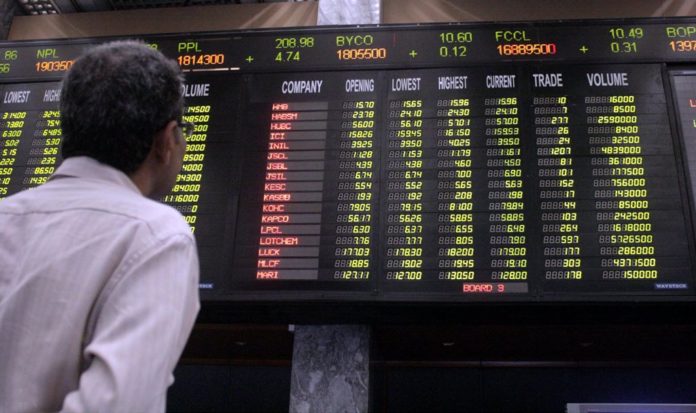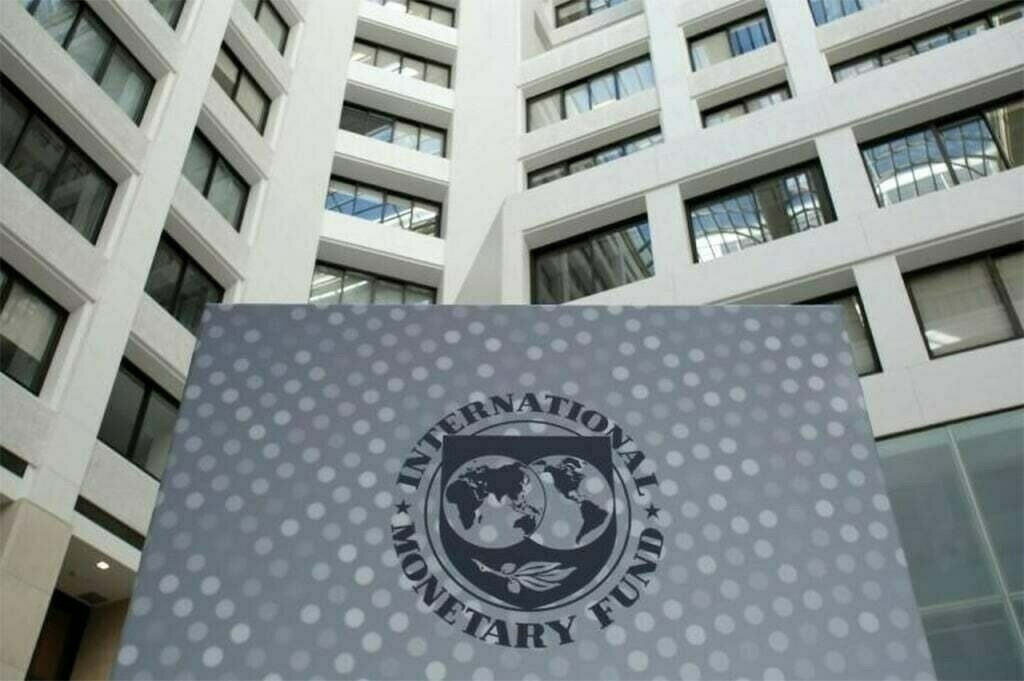PTBP Web Desk
The Pakistan Stock Exchange (PSX) faced renewed selling pressure on Tuesday, as investors engaged in heavy profit-taking following two consecutive sessions of robust gains. The benchmark KSE-100 Index dropped by more than 1,500 points, reflecting a shift in investor sentiment amid uncertainty over revenue performance and mixed global market cues.
The market opened on a positive note, continuing the bullish tone from Monday. However, optimism faded quickly as investors began to book profits, leading to a sharp downturn. The index oscillated between an intraday high of 163,384.95 and a low of 161,159.26, before settling at 161,281.77, down 1,521.39 points or 0.93% by the end of the trading session.
According to a report from Topline Securities, the selling was primarily driven by blue-chip counters, including ENGRO Corporation, Mari Petroleum (MARI), Bank AL Habib Limited (BAHL), MCB Bank, and TRG Pakistan. These heavyweights collectively shaved off 543 points from the KSE-100 Index.
“After two consecutive sessions of strong gains, the local bourse witnessed renewed bearish sentiment as investors opted for profit-taking,” the brokerage noted.
Market analysts attributed the downturn to investor caution following concerns about fiscal imbalances and the lack of new taxation measures to address the growing revenue shortfall.
In a key economic development, Federal Board of Revenue (FBR) Chairman Rashid Mahmood Langrial ruled out the possibility of introducing new taxation measures despite a revenue shortfall of Rs 275 billion during the July–October (2025–26) period.
This announcement, while signaling fiscal restraint, also stirred market uncertainty. Investors perceived the FBR’s stance as a missed opportunity to address the growing fiscal gap, potentially putting pressure on the government’s revenue targets for the fiscal year.
Analysts suggest that without fresh fiscal measures, the government might struggle to maintain budgetary discipline, which could affect investor confidence in the medium term.
The bearish shift came just a day after the PSX started the week on a strong footing. On Monday, the benchmark KSE-100 Index had surged 1,171.42 points (0.72%) to close at 162,803.16 points, buoyed by optimism over regional stability following last week’s Pakistan–Afghanistan ceasefire and a rebound in global equities.
However, Tuesday’s reversal demonstrated how quickly market sentiment can change in response to profit-taking and external financial cues.
Global stock markets presented a mixed picture on Tuesday. A rise in tech shares propelled Japan’s Nikkei and Taiwan’s TAIEX to all-time highs, while other regional markets struggled to maintain momentum.
- Japan’s Nikkei 225 rose 0.2% to a record 52,636.87, reversing early losses.
- Taiwan’s TAIEX advanced 0.5%, marking its own record high.
- In contrast, South Korea’s KOSPI fell 1.5% after a sharp 2.8% rally the previous day.
- Hong Kong’s Hang Seng inched up 0.1%, while Chinese blue chips eased by 0.1%.
- Australia’s ASX benchmark dropped to a one-month low, as traders awaited the Reserve Bank of Australia’s policy decision with no immediate rate cut expected.
In the United States, tech stocks buoyed both the S&P 500 and Nasdaq overnight, though futures later pointed to minor declines of 0.3% and 0.5%, respectively. Weak US economic data and conflicting signals from Federal Reserve officials added further uncertainty to global market sentiment, particularly regarding the prospects of a December interest rate cut.
(For international market updates, see Reuters Markets).
While equities declined, the Pakistani rupee showed a slight improvement against the US dollar in the inter-bank market. By the close of trading, the rupee appreciated by Re0.03, settling at Rs280.87 per dollar.
Currency analysts described the gain as marginal but important, suggesting that stable foreign exchange reserves and reduced import pressures have supported the rupee in recent weeks.
Market activity was subdued compared to the previous session. Total volume on the all-share index fell to 899.41 million shares, down from 949.36 million on Monday. Similarly, the value of traded shares decreased from Rs47.58 billion to Rs37.31 billion, indicating reduced investor participation amid heightened uncertainty.
Among active stocks:
- WorldCall Telecom led the volumes with 78.87 million shares traded.
- Telecard Limited followed with 76.86 million shares.
- K-Electric Ltd ranked third with 71.62 million shares.
A total of 479 companies were traded on Tuesday. Out of these, 133 posted gains, 314 recorded losses, and 32 remained unchanged, reflecting a broadly negative trend across the market.
Market watchers believe the decline was largely technical, following a sharp rally earlier in the week. “Short-term corrections are normal after strong upward movements,” said a Karachi-based analyst. “However, sustained foreign inflows, stable exchange rates, and clarity on fiscal policy will determine the market’s direction in the coming days.”
While Tuesday’s drop dented short-term momentum, long-term fundamentals remain relatively intact, especially if corporate earnings continue to improve and the government maintains its economic reform trajectory.



